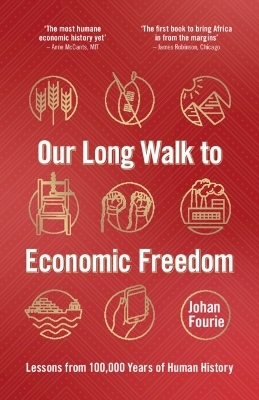
Our Long Walk to Economic Freedom
Cambridge University Press (Verlag)
978-1-009-22848-0 (ISBN)
Our Long Walk to Economic Freedom is an entertaining and engaging guide to global economic history told for the first time from an African perspective. In thirty-five short chapters Johan Fourie tells the story of 100,000 years of human history spanning humankind's migration out of Africa to the Covid-19 pandemic. His unique account reveals just how much we can learn by asking unexpected questions such as 'How could a movie embarrass Stalin?', 'Why do the Japanese play rugby?' and 'What do an Indonesian volcano, Frankenstein and Shaka Zulu have in common?'. The book sheds new light on urgent debates about the roots and reasons for prosperity, the march of opportunity versus the crushing boot of exploitation, and why it is the builders of society – rather than the burglars –who ultimately win out.
Johan Fourie is Professor of Economics at Stellenbosch University, South Africa, where he coordinates the Laboratory for the Economics of Africa's Past (LEAP). He is a National Research Foundation-rated scholar, co-founder of the African Economic History Network and former editor of Economic History of Developing Regions.
Introduction: How do we thrive?; 1. Who are the architects of Wakanda? African economic historians and the stories we tell; 2. What happened at Blombos in 70,000 BCE? The Out-of-Africa hypothesis and the peopling of the world; 3. Why are the Danes so individualistic? The Neolithic Revolution and the rise of civilisations; 4. Why does isiXhosa have clicks? The Bantu migration; 5. How did Joseph and his eleven brothers solve the three economic problems? Custom and command in the ancient world; 6. What do Charlemagne and King Zwelithini have in common? Feudalism; 7. Why do Indians have dowry and Africans lobola? Precolonial African economic systems; 8. Who was the richest man ever to live? The spread of Islam in Africa and the Crusades; 9. How did 168 Spanish conquistadores capture an empire? Europeans in the New World; 10. Why was a giraffe the perfect gift for the Chinese emperor? The Indian Ocean trade and European imperialism; 11. Who visited Gorée island on 27 June 2013? The Atlantic slave trade and Africa's long-run development; 12. What is an incunabulum? Book printing and the Reformation; 13. Who was Autshumao's niece? The arrival of Europeans in South Africa and the demise of the Khoesan; 14. What did Thomson, Watson & Co. purchase? The emancipation of the enslaved; 15. What do an Indonesian volcano, Frankenstein and Shaka Zulu have in common? The Mfecane and Great Trek; 16. Why was the spinning jenny not invented in India? Science, technology and the Industrial Revolution; 17. Why did railways hurt Basotho farmers? South Africa's mineral revolution; 18. What did Sol Plaatje find on his journey through South Africa? Property rights and labour coercion; 19. Why can you have any car as long as it is black? The rise of American industry; 20. What does a butterfly collector do in the Congo? The Berlin Conference and the colonisation of Africa; 21. Who wrote the best closing line of modern literature? The Great Depression and the New Deal; 22. How could a movie embarrass Stalin? Russia and the turn to communism; 23. Who is the perfect soldier? The causes and consequences of the Second World War; 24. What was the Great Leap Forward? Mao Zedong, famine and the Cultural Revolution; 25. Why should we cry for Argentina? A country reverses; 26. Who was the last king of Scotland? African independence struggles; 27. How did Einstein help create Eskom? South Africa industrialises; 28. Why would you want to eat sushi in the Transkei? The economics of apartheid; 29. Why do the Japanese play rugby? The rise of the East Asian economies; 30. What do Lego and the greatest invention of the twentieth century have in common? The second era of globalisation; 31. What is funny about Moore's law? ICT and the Fourth Industrial Revolution; 32. What bubbles in Iceland? The Global Financial Crisis of 2008; 33. What did The Economist get spectacularly wrong? Africa after 2000; 34. Will Madiba's Long Walk to Freedom ever end? The first 25 years of democracy and the future of South Africa; 35. What should no scholar ever do? Predicting the future; Epilogue: How do you win a World Cup?
| Erscheinungsdatum | 25.07.2022 |
|---|---|
| Zusatzinfo | Worked examples or Exercises |
| Verlagsort | Cambridge |
| Sprache | englisch |
| Maße | 139 x 215 mm |
| Gewicht | 380 g |
| Themenwelt | Geisteswissenschaften ► Geschichte ► Allgemeine Geschichte |
| Geisteswissenschaften ► Geschichte ► Regional- / Ländergeschichte | |
| Geschichte ► Teilgebiete der Geschichte ► Wirtschaftsgeschichte | |
| ISBN-10 | 1-009-22848-X / 100922848X |
| ISBN-13 | 978-1-009-22848-0 / 9781009228480 |
| Zustand | Neuware |
| Haben Sie eine Frage zum Produkt? |
aus dem Bereich


